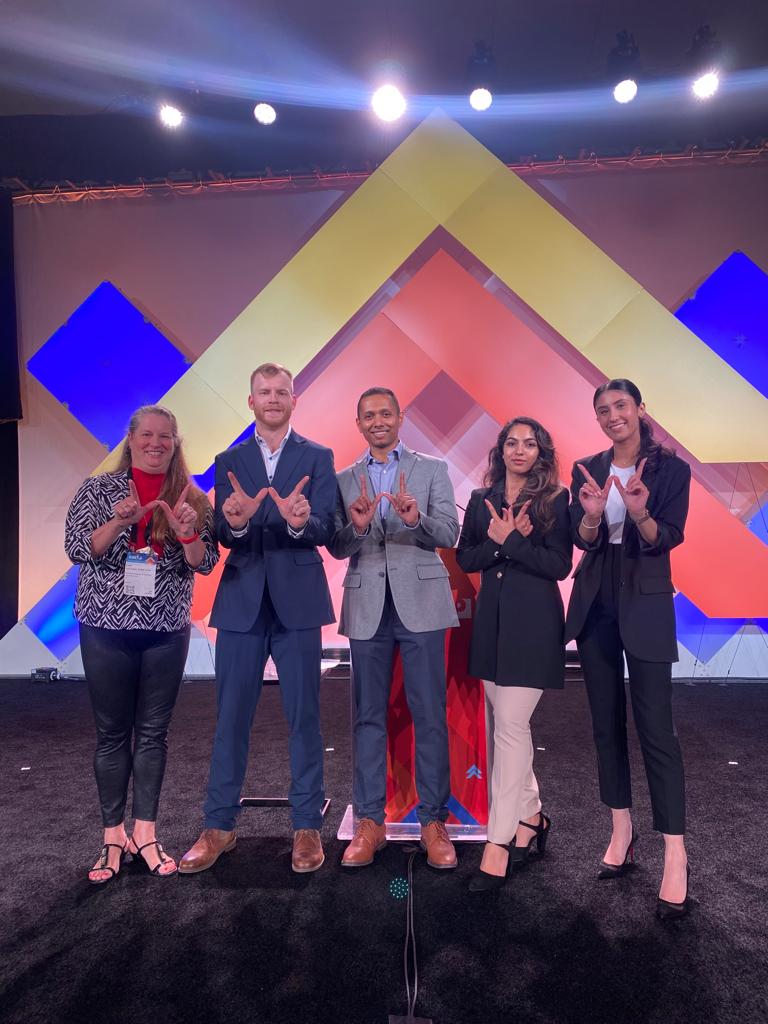Ilitch School of Business students bring home third place of 26 teams at ISM case competition

Vinothkumar Jayapathi; Mahin Fatima; Manaal Mahmood
Twenty-six teams competed in the 2023 ISM conference and case competition, a series of competitions that take place throughout the year where students create a plan to solve a tricky business problem. This year, a team from the Mike Ilitch School of Business took home third prize, beating out twenty-three other teams.
The final round of the competition was held in Grapevine, Texas, where the four teams that placed highest of the original 26 met. For the 2023 competition, the teams were asked to help a fictional hydrogen fuel cell company develop their holdings in rare earth metals. They had a month to prepare and present their solutions before a panel of judges and a crowd.
"We do these case studies throughout college, undergrad and graduate school," says Justin Danks, who competed in the case competition as a graduate student and is now an Ilitch school alum. "It's initially overwhelming, you get a packet and you read through it a bunch of times and each time you'd learn something new, or you'd catch a new detail."
Danks has competed in case competitions before and helped his team place first at a competition as an undergrad.
"I guess I just liked the idea, I'm competitive and it was a good learning opportunity, good networking opportunity, and it's just fun to turn your academics into real tangible results," says Danks.
Assistant professor of teaching Lori Sisk helped organize the teams from the Ilitch school. Before coming to Wayne State, Sisk worked for automotive and consulting companies solving problems similar to the case competition questions.
"In my classes students learned how to put together a case and present a case document," Sisk explains. "I work very hard to make sure students learn from what they present in my class, and that they are able to take that into the case competitions where they get more feedback, they get different ideas from their teammates, so I think it works hand in hand."
While the other three teams consisted solely of graduate students, the team sent from the Ilitch school was a mix of graduate and undergraduate students. Sisk says she was intentional about mixing graduate and undergraduate students.
"I like to have that mix because our undergrads learn from our grads, and it provides great learning for both," says Sisk. "Even the grad students learned a lot from the undergrad. It really is great when we can combine both graduate and undergraduate students."
Undergraduate member of the case competition team Mahin Fatima, a rising senior majoring in global supply chain and information systems management, agrees that when graduate and undergraduate students work together, more learning happens.
"Their wealth of knowledge was amazing, and I learned as much from them as I did from trying to solve the competition itself," says Fatima. "I think both of those things really add to my supply chain education here."
The competition wasn't the only highlight of the conference. Also available to participants were panel discussions, presentations from industry leaders, and networking opportunities that help students build their careers.
"ISM always goes all out on their conferences," explains Fatima. "I had the chance to meet so many startups, and a lot of technology and consulting focused supply chain companies. Being able to meet all of those companies was amazing, I have those lifelong connections now and a few job offers along the way."
Attending and competing at these events isn't just good for the students who had a chance to compete, it's good for the school as a whole.
"We were able to meet a lot of vice presidents, CEO's and so Wayne State is definitely becoming known as a place to recruit from as far as supply chain," says Sisk. "Which is one of our main goals, for students is to get jobs coming out of school."